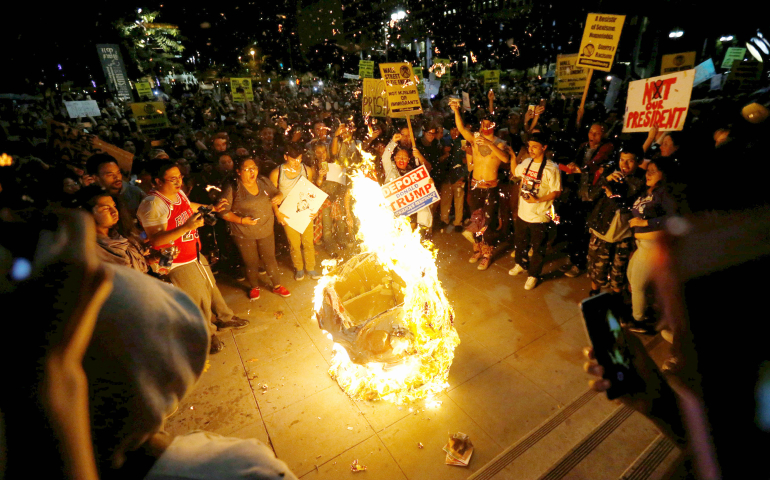
A Donald Trump pinata is burned during an election protest in Los Angeles Nov. 9. (CNS/Mario Anzuoni, Reuters)
In one way or another, everybody seems to have a beef with someone else.
It's not just about elections. In the United States, there are the presidential results. But it is also about mundane issues. There's a lot of "that's mine and you can't have it" going around.
So, yes, it is about immigration and health care.
But it is also about office frictions and parking spaces.
People are defending their space and positions with increasing shrillness, and with decreasing civility and professionalism. The substance and the level of anger vary, but it is anger all the same, an anger that disfigures discussion to the point that there is no discussion at all.
This is not to say that conversation requires compromise. Not every white point needs to meld with a black point so that gray results. Some things are objectively right or wrong. But changing the tone so that civil (or even personal) discourse turns into a one-on-one shouting match is more and more the name of the game.
In the micro, office frictions escalate to nasty backstabbing, and parking space confrontations turn into murders. Mine is mine and you cannot have it, no matter what.
Enlarge the problem and you have mobs of people mounting angry protests. Lately, Austin, Chicago, Fort Lauderdale, Hollywood, Los Angeles, New York, Philadelphia and Seattle suffered riot or near-riot conditions caused by groups of individuals whose candidate failed in the general election.
Who and what does that serve? I cannot see any equation between shouting and discussing, between breaking windows and resolving differences.
It seems to me that rather than look for solutions within the reality of the moment, the complainers are looking for a new reality, an alternative reality of their own making, that suits their pleasure.
Can both sides not agree on a few facts, and at least on two issues? First: No one wants to see anyone starve. Second: No one wants to see anyone go without medical care.
Is the question about immigrants and refugees -- the persons displaced by war and by poverty -- who see Europe, Australia, the United States and Canada as places they can peacefully begin new lives? Louisville, Ky., Archbishop Joseph Kurtz, the outgoing president of the U.S. Conference of Catholic Bishops, was right this week when he told the assembled bishops in Baltimore, "Our nation is on thin ice when refugee families are spoken of in the abstract."
Is the question about people without health insurance -- the folks who must find necessary medical attention -- who look to universal health care, even socialized medicine, as the answer? President-elect Donald Trump was right when he said coverage for pre-existing conditions and extended insurance for children left at home were necessary in whatever health care program comes in his administration.
Can we not tone down the anger? No one wants to see traffic disrupted, people punched, cars overturned, and businesses disrupted. The most telling acceptance of the general election came from the world markets. After falling 800 points in the middle of the night, when it was clear Trump would win, they were up 300 points by the end of the following day. Why? Because the system worked. The government did not crumble, a peaceful transition of power was certain, and both major candidates behaved like civil adults.
Even so, the society seems aimed more at chaos than constructive conversation, and it is no one's fault but our own. "Anger management" is a bit of a buzzword, but it is one we might all take to heart next time there's contest, whether for a parking space or an elected office.
[Phyllis Zagano is senior research associate-in-residence at Hofstra University in Hempstead, N.Y. Her most recent books include The Light of the World: Daily Meditations for Advent and Christmas, Women Deacons?: Essays with Answers and In the Image of Christ: Essays on Being Catholic and Female.]
Editor's note: We can send you an email alert every time Phyllis Zagano's column, Just Catholic, is posted. Go to this page and follow directions: Email alert sign-up.
